
William Goldman was an American novelist, playwright, and screenwriter. He first came to prominence in the 1950s as a novelist before turning to screenwriting. Among other accolades, Goldman won two Academy Awards in both writing categories: first for Best Original Screenplay for Butch Cassidy and the Sundance Kid (1969) and then for Best Adapted Screenplay for All the President's Men (1976).

Marsha Mason is an American actress and theatre director. She has been nominated four times for the Academy Award for Best Actress for her performances in Cinderella Liberty (1973), The Goodbye Girl (1977), Chapter Two (1979), and Only When I Laugh (1981). The first two also won her Golden Globe Awards. She was married for 10 years (1973–1983) to the playwright and screenwriter Neil Simon, who wrote all but the first film cited above, in addition to several others in which she starred.
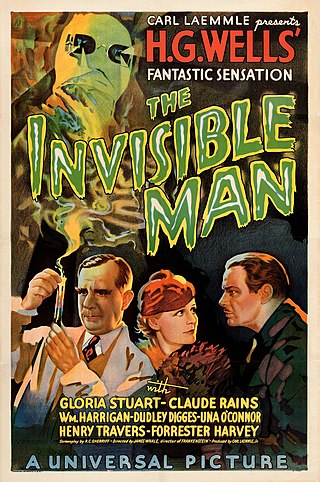
The Invisible Man is a 1933 pre-Code American science fiction horror film directed by James Whale loosely based on H. G. Wells's 1897 novel, The Invisible Man, produced by Universal Pictures, and starring Gloria Stuart, Claude Rains and William Harrigan. The film involves a stranger named Dr. Jack Griffin (Rains) who is covered in bandages and has his eyes obscured by dark glasses, the result of a secret experiment that makes him invisible, taking lodging in the village of Iping. Never leaving his quarters, the stranger demands that the staff leave him completely alone until his landlady and the villagers discover he is invisible. Griffin goes to the house of his colleague, Dr. Kemp and tells him of his plans to create a reign of terror. His fiancée Flora Cranley, the daughter of his employer Dr. Cranley, soon learn that Griffin's discovery has driven him insane, leading him to prove his superiority over other people by performing harmless pranks at first and eventually turning to murder.

Chattahoochee is a 1989 American drama film directed by Mick Jackson and starring Gary Oldman and Dennis Hopper. The film is based on the real-life experiences of Chris Calhoun in a Florida state mental institution. Calhoun later met James Hicks who wrote the script. It was turned down by several major studios before being accepted by Hemdale Film Corporation, a small British-owned, Los Angeles–based company that also produced Platoon, Hoosiers, The Last Emperor, and Salvador.

Mars Attacks! is a 1996 American black comedy science fiction film directed by Tim Burton, who also co-produced it with Larry J. Franco. The screenplay by Jonathan Gems was based on the Topps trading card series of the same name. The film features an ensemble cast consisting of Jack Nicholson, Glenn Close, Annette Bening, Pierce Brosnan, Danny DeVito, Martin Short, Sarah Jessica Parker, Michael J. Fox, Pam Grier, Rod Steiger, Tom Jones, Lukas Haas, Natalie Portman, Jim Brown, Lisa Marie, and Sylvia Sidney in her final film role.
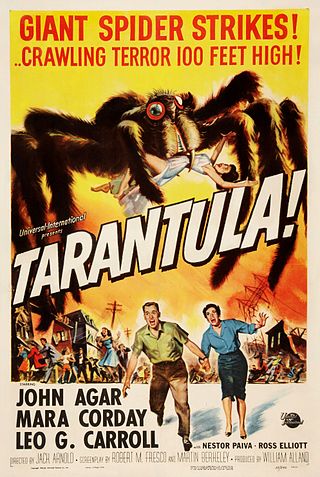
Tarantula is a 1955 American science-fiction monster film produced by William Alland and directed by Jack Arnold. It stars John Agar, Mara Corday, and Leo G. Carroll. The film is about a scientist developing a miracle nutrient to feed a rapidly growing human population. In its unperfected state, the nutrient causes extraordinarily rapid growth, creating a deadly problem when a tarantula test subject escapes and continues to grow larger and larger. The screenplay by Robert M. Fresco and Martin Berkeley was based on a story by Arnold, which was in turn inspired by Fresco's teleplay for the 1955 Science Fiction Theatre episode "No Food for Thought", also directed by Arnold. The film was distributed by Universal Pictures as a Universal-International release, and reissued in 1962 through Sherman S. Krellberg's Ultra Pictures.

The Golden Boot Awards were an American acknowledgement of achievement honoring actors, actresses, and crew members who made significant contributions to the genre of Westerns in television and film. The award was sponsored and presented by the Motion Picture & Television Fund. Money raised at the award banquet was used to help finance various services offered by the Fund to those in the entertainment industry.

Along Came Jones is a 1945 American Western comedy film directed by Stuart Heisler and starring Gary Cooper, Loretta Young, William Demarest, and Dan Duryea. The film was adapted by Nunnally Johnson from the 1944 novel Useless Cowboy by Alan Le May. It was the only feature film produced by Cooper during his long film career.

For Better or Worse is a 1995 American comedy-drama film written by Jeff Nathanson and directed by Jason Alexander, who stars alongside Lolita Davidovich and James Woods. The film was given a limited theatrical release, and aired on TNT in 1996.

Men of War is a 1994 action film directed by Perry Lang, written by John Sayles, and revised by Ethan Reiff and Cyrus Voris. It stars Dolph Lundgren as Nick Gunar, a former Special Ops soldier who leads a group of mercenaries to a treasure island in the South China Sea.
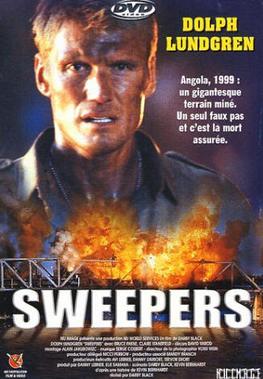
Sweepers is a 1998 American-South African action film directed by Keoni Waxman and starring Dolph Lundgren, Claire Stansfield and Bruce Payne.

Evil Town is a 1987 American zombie horror film directed by Curtis Hanson, Mardi Rustam, Larry Spiegel and Peter S. Traynor. Evil Town was the last film with the actor Dean Jagger.
The Lion, the Witch and the Wardrobe is a British children's television drama first broadcast by the BBC in 1988. It was the first series of The Chronicles of Narnia that ran from 1988 to 1990.
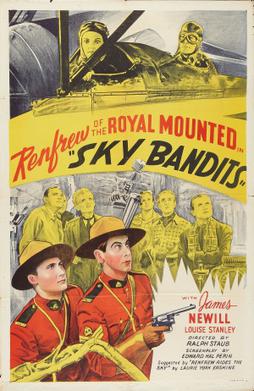
Sky Bandits, also known as Renfrew of the Royal Mounted in Sky Bandits, is a 1940 American action film directed by Ralph Staub and released by Monogram Pictures, starring James Newill, Louise Stanley, Dewey Robinson and William Pawley. The film is a remake of the film Ghost Patrol (1936) with a musical/action formula, similar to the format of the "singing cowboy" films of the era.
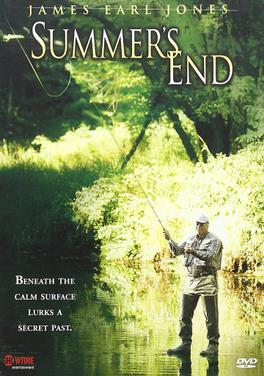
Summer's End is a 1999 drama television film directed by Helen Shaver from a screenplay by Grant Scharbo and Jim Thompson, based on a story by Scharbo. The film tells the story of two teenage brothers who have lost their father, one of which befriends an African-American physician facing racial prejudice in a small town in Georgia.
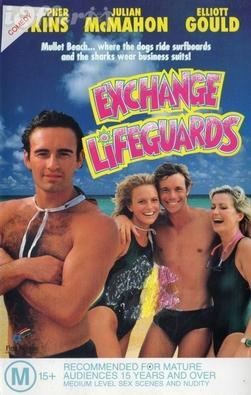
Exchange Lifeguards known in the United States as Wet and Wild Summer!, is a 1992 Australian-American comedy film directed by Maurice Murphy and starring Christopher Atkins, Julian McMahon and Elliott Gould.
The fifteenth series of the British television drama series Grange Hill began broadcasting on 7 January 1992, before ending on 13 March 1992 on BBC One. The series follows the lives of the staff and pupils of the eponymous school, an inner-city London comprehensive school. It consists of twenty episodes.
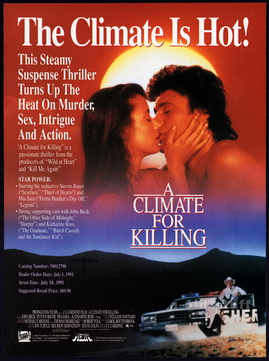
A Climate for Killing is a 1991 American thriller-drama film written and directed by J. S. Cardone and starring John Beck, Katharine Ross, Steven Bauer and Mia Sara.
Striking Point is an action film directed by Thomas H. Fenton and starring Christopher Mitchum, Ivan Rogers, Stan Morse, Mark Hanson, Tracy Spaulding, and Rocky Patterson. It is about detectives in their quest to stop the KGB from bringing in weapons for gangs in the United States.
















